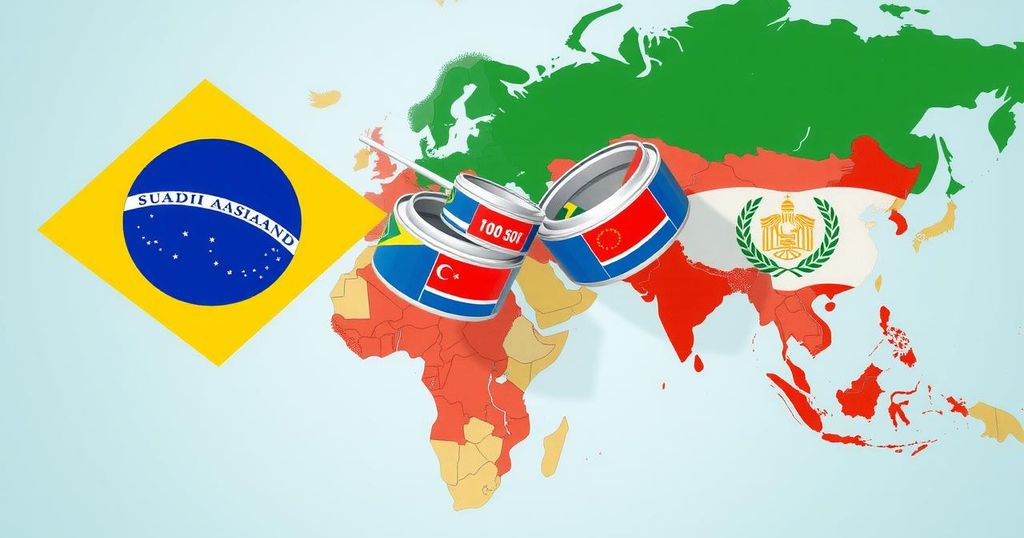Politics
Technology
AG, ARMENIA, ASIA, BELARUS, BRAZIL, COLOMBIA, DATA ANALYSIS, EEU, EMPLOYEE BENEFITS, EURASIAN ECONOMIC UNION, EURASIAN UNION, EUROPE, EUROPE/ASIA, EXPORTS, GOOGLE, GOV. BR, GOVB. BR, GOVERNMENT, INTERNATIONAL TRADE, KYRGYZSTAN, MAPA, MINISTÉRIO DA AGRICULTURA E PECUÁRIA, MINISTERIO DA AGRICULTURA E PECUARIA, MINISTÉRIO DAS RELAÇÕES EXTERIORES, MINISTERIO DAS RELACOES EXTERIORES, MINISTRY OF AGRICULTURE AND LIVESTOCK, MINISTRY OF FOREIGN AFFAIRS, MRE, NOT, RUSSIA, SOUTH AMERICA, SUPPLY CHAIN, TRADE
Jamal Walker
0 Comments
Brazil Expands Agricultural Export Markets in EEU, Saudi Arabia, and Thailand
The Brazilian government has successfully opened new agricultural export markets in the Eurasian Economic Union, Saudi Arabia, and Thailand for products such as bananas, walnuts, yerba mate, macadamia nuts, fishmeal, and fish oil. These efforts reflect a strategic diversification of Brazil’s export portfolio and bolster international trade ties, leading to a total of 299 market openings since early 2023.
The Brazilian government has marked significant progress in expanding its agricultural export markets by recently securing authorization from several nations. Notably, the Eurasian Economic Union (EEU), encompassing Armenia, Belarus, Kazakhstan, Kyrgyzstan, and Russia, has permitted Brazil to export bananas and walnuts. In 2023, Brazil’s agricultural exports to the EEU totaled over USD 1.3 billion. Moreover, Saudi Arabia has opened its market to Brazilian yerba mate and macadamia nuts, with an impressive USD 2.3 billion in agricultural exports anticipated in 2024. Additionally, Thailand has allowed the importation of fishmeal and fish oil from Brazil, a sector that saw imports exceeding USD 2.7 billion between January and November 2024. These developments reflect the Brazilian government’s commitment to diversifying its export portfolio and reinforcing international trade relations, demonstrating the global trust in Brazil’s agricultural standards.
As of 2024, Brazilian agribusinesses will benefit from 221 newly opened markets, contributing to a total of 299 new opportunities since the start of 2023. Such outcomes are the result of collaborative efforts between the Ministry of Agriculture and Livestock (MAPA) and the Ministry of Foreign Affairs (MRE). This proactive approach aims to not only increase exports but also enhance Brazil’s positioning in the global agricultural market.
Brazil’s agricultural sector plays a vital role in its economy, contributing significantly to export revenues. In an effort to increase its influence and sustainability in the global market, the Brazilian government actively seeks to open new trade avenues. Recent approvals from national authorities allow Brazil to export various new agricultural products to important markets, including the EEU, Saudi Arabia, and Thailand. These advancements illustrate not only Brazil’s competence in sanitary and phytosanitary controls but also the necessity of diversifying export markets amid global economic fluctuations.
In conclusion, Brazil’s efforts to expand its agricultural export markets underscore its strategic positioning in the global economy. The recent authorizations from different countries to import Brazilian products signify robust agricultural standards and international trust in Brazil’s systems. As Brazil forges ahead with 221 new market openings by 2024, this proactive approach will undoubtedly enhance economic resilience and promote trade partnerships across various regions.
Original Source: www.gov.br




Post Comment